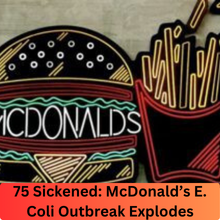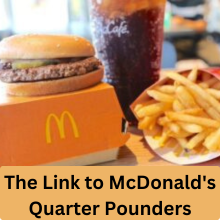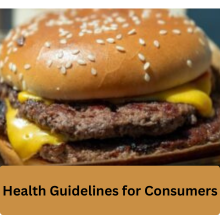
A recent outbreak of E. coli poisoning has taken a serious turn, with at least 75 people reported sick across 13 states, all linked to McDonald’s Quarter Pounders. The Centers for Disease Control and Prevention (CDC) has confirmed that among those affected, 22 individuals have been hospitalized, and tragically, one person has died in Colorado. The source of this outbreak remains elusive, but early investigations point toward uncooked slivered onions as a likely culprit. Let’s dive deeper into what’s happening, why it matters, and how it affects you.
What is E. Coli?
E. coli, or Escherichia coli, is a type of bacteria that normally lives in the intestines of healthy people and animals. Although most species are harmless, some species can cause serious foodborne illness. These harmful strains can lead to symptoms ranging from mild stomach upset to severe abdominal cramps, vomiting, and diarrhea. Contaminated food, especially undercooked beef, unpasteurized milk, and fresh produce, is a common source of E. coli infections.
Background of the Outbreak
This outbreak appears to have originated between September 27 and October 11, with cases popping up rapidly across multiple states. Initially, reports indicated 49 cases across 10 states, but the numbers have since soared, prompting federal health officials to take action. Each new case raised alarms, highlighting the outbreak’s swift expansion and the potential risks involved in dining out.
The Link to McDonald’s Quarter Pounders
The CDC and other health officials quickly zeroed in on McDonald’s Quarter Pounders as the common thread among those infected. It’s a significant concern because these burgers are a staple at McDonald’s locations across the country. The investigation identified uncooked slivered onions, supplied by Taylor Farms, as a likely source of the contamination. This connection prompted swift action from both McDonald’s and health authorities.
Statistics and Impact
As of the latest reports, Colorado has seen the highest number of cases, with 26 individuals falling ill. Other states affected include Montana (13 cases), Nebraska (11), and smaller numbers in New Mexico, Utah, Missouri, Wyoming, Michigan, Iowa, Kansas, Oregon, Wisconsin, and Washington. The rapid spread of E. coli has put immense pressure on the health system, with 22 hospitalizations and ongoing monitoring for additional cases.
Who is Most Affected?
While E. coli can affect anyone, certain groups are at higher risk, including young children, the elderly, pregnant women, and individuals with weakened immune systems. Symptoms can appear within days of eating contaminated food, typically including fever, vomiting, and severe diarrhea. In extreme cases, infections can lead to a life-threatening condition known as hemolytic uremic syndrome (HUS), particularly dangerous for young children.
What McDonald’s is Doing
In response to the outbreak, McDonald’s has taken significant steps to mitigate the situation. The fast-food giant has announced that it will stop sourcing onions from Taylor Farms’ Colorado facility indefinitely. Additionally, they have temporarily removed Quarter Pounders from menus in certain regions to protect their customers. This response reflects the company’s commitment to safety, though it also raises questions about the broader implications for the fast-food industry.
The Role of Taylor Farms
Taylor Farms, the supplier of the onions implicated in this outbreak, acted quickly by recalling yellow onions distributed from its Colorado facility. The company has expressed deep concern for those affected and is actively cooperating with the CDC and FDA as investigations continue. This incident highlights the complex supply chains in the food industry and the challenges that come with ensuring food safety.
Response from Other Restaurants
The ripple effect of this outbreak is being felt beyond McDonald’s. Other fast-food chains, including Taco Bell, KFC, and Burger King, have preemptively pulled onions from their menus in certain areas as a precautionary measure. This showcases the interconnected nature of the fast-food industry, where one outbreak can lead to widespread changes across multiple brands.
Also read: Sabrina Carpenter Joins Taylor Swift for Surprise NOLA Performance
Legal Actions and Implications
With the outbreak growing in scale, legal actions are already unfolding. Individuals affected by the outbreak are beginning to file lawsuits against McDonald’s. One notable case involves a Nebraska woman who fell ill after consuming a Quarter Pounder. These legal battles may pave the way for increased scrutiny on food safety practices within the fast-food industry.
Health Guidelines for Consumers
As consumers, it’s crucial to stay informed and vigilant about food safety. Here are a few preventive measures:
- Wash Your Hands: Always wash your hands before eating.
- Cook Thoroughly: Ensure meats are cooked to the proper temperature.
- Stay Informed: Pay attention to health alerts and recalls.
If you suspect you have an E. coli infection, seek medical attention immediately. Symptoms can escalate quickly, and early intervention is vital.
The Importance of Food Safety Regulations
The role of agencies like the CDC and FDA is critical in protecting public health. Their investigations and subsequent recalls help contain outbreaks and prevent further illnesses. Transparency in these processes is essential, as it builds consumer trust and ensures that health risks are communicated effectively.
Moving Forward
As this outbreak unfolds, it serves as a stark reminder of the importance of food safety practices in the fast-food industry. McDonald’s, along with other chains, will need to reassess their supply chains and food safety protocols to rebuild consumer trust. The question remains: how will this impact our dining choices in the future?
Also read: Is Saturday Night Live New Tonight? Here’s What to Expect
Conclusion
The expanding E. coli outbreak linked to McDonald’s Quarter Pounders has put a spotlight on food safety in the fast-food industry. With 75 people affected and legal actions on the horizon, it’s crucial for both consumers and companies to prioritize safety. Staying informed and aware can help protect ourselves and our communities from future outbreaks.
FAQs
What are the symptoms of E. coli?
Symptoms typically include severe abdominal cramps, diarrhea (often bloody), vomiting, and fever.
How long does E. coli last?
Symptoms usually appear within 1 to 10 days after exposure and can last about a week.
Can I still eat at McDonald’s?
While McDonald’s has removed the affected items, it’s wise to stay informed about health updates.
What should I do if I have symptoms?
If you experience symptoms, especially severe diarrhea or dehydration, seek medical care immediately.
How does E. coli affect children differently?
Children are more susceptible to severe symptoms and complications, making prompt medical attention essential.

